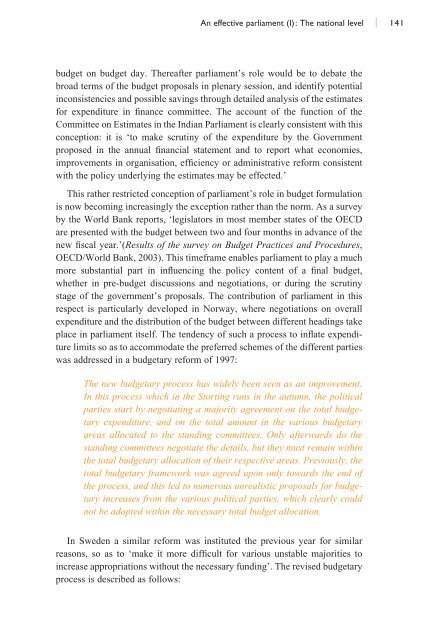PARLIAMENT AND DEMOCRACY - Inter-Parliamentary Union
PARLIAMENT AND DEMOCRACY - Inter-Parliamentary Union
PARLIAMENT AND DEMOCRACY - Inter-Parliamentary Union
Create successful ePaper yourself
Turn your PDF publications into a flip-book with our unique Google optimized e-Paper software.
An effective parliament (I): The national level I 141<br />
budget on budget day. Thereafter parliament’s role would be to debate the<br />
broad terms of the budget proposals in plenary session, and identify potential<br />
inconsistencies and possible savings through detailed analysis of the estimates<br />
for expenditure in finance committee. The account of the function of the<br />
Committee on Estimates in the Indian Parliament is clearly consistent with this<br />
conception: it is ‘to make scrutiny of the expenditure by the Government<br />
proposed in the annual financial statement and to report what economies,<br />
improvements in organisation, efficiency or administrative reform consistent<br />
with the policy underlying the estimates may be effected.’<br />
This rather restricted conception of parliament’s role in budget formulation<br />
is now becoming increasingly the exception rather than the norm. As a survey<br />
by the World Bank reports, ‘legislators in most member states of the OECD<br />
are presented with the budget between two and four months in advance of the<br />
new fiscal year.’(Results of the survey on Budget Practices and Procedures,<br />
OECD/World Bank, 2003). This timeframe enables parliament to play a much<br />
more substantial part in influencing the policy content of a final budget,<br />
whether in pre-budget discussions and negotiations, or during the scrutiny<br />
stage of the government’s proposals. The contribution of parliament in this<br />
respect is particularly developed in Norway, where negotiations on overall<br />
expenditure and the distribution of the budget between different headings take<br />
place in parliament itself. The tendency of such a process to inflate expenditure<br />
limits so as to accommodate the preferred schemes of the different parties<br />
was addressed in a budgetary reform of 1997:<br />
The new budgetary process has widely been seen as an improvement.<br />
In this process which in the Storting runs in the autumn, the political<br />
parties start by negotiating a majority agreement on the total budgetary<br />
expenditure, and on the total amount in the various budgetary<br />
areas allocated to the standing committees. Only afterwards do the<br />
standing committees negotiate the details, but they must remain within<br />
the total budgetary allocation of their respective areas. Previously, the<br />
total budgetary framework was agreed upon only towards the end of<br />
the process, and this led to numerous unrealistic proposals for budgetary<br />
increases from the various political parties, which clearly could<br />
not be adopted within the necessary total budget allocation.<br />
In Sweden a similar reform was instituted the previous year for similar<br />
reasons, so as to ‘make it more difficult for various unstable majorities to<br />
increase appropriations without the necessary funding’. The revised budgetary<br />
process is described as follows:

















